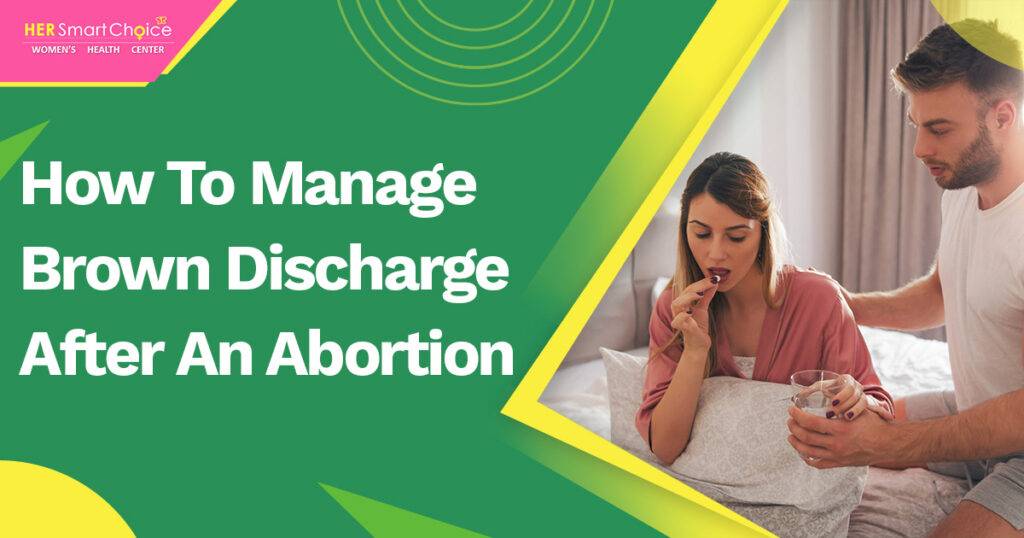How Long Does Brown Discharge Occur After An Abortion?
Abortion always brings an extensive list of questions and concerns with it, especially for those who have gone through the procedure or are considering it. One common concern is how long brown discharge may occur after an abortion. Let’s take an insight into the process of abortion, specifically surgical abortion in Los Angeles. We hope to offer clarity and alleviate some of the uncertainty that can surround this issue.
Follow Us!
Exploring How To Do Early Abortion Works And Its Core Fundamentals

Before we delve into the duration of brown discharge after abortion, it’s essential to understand how early abortions work. Early abortions are typically divided into two main methods: medication abortion and surgical abortion. The choice between these methods depends on the stage of pregnancy and individual preferences. In this article, we will primarily focus on surgical abortion.
Surgical abortion in Los Angeles, often performed in clinics or healthcare facilities, involves a healthcare provider removing the pregnancy from the uterus. It’s considered a safe and effective way to terminate a pregnancy, and the recovery process typically begins right after the procedure. However, some common post-abortion experiences, including brown discharge, can lead to confusion and concern.
The Timeline of Brown Discharge After Abortion
Brown discharge after an abortion is a common occurrence and is usually nothing to be overly concerned about. This discharge is often the body’s way of shedding excess tissue and blood remaining in the uterus after the procedure. Here’s a general timeline of what you can expect:
Immediately After the Procedure: In the hours following a surgical abortion, you might experience some bleeding. Initially, this blood may be bright red, resembling a heavy period. This is entirely normal and expected.
The First Few Days: As the days pass, the bleeding may transition from bright red to a lighter shade of red or pink. This is a sign that the body is healing and the amount of blood being discharged is decreasing.
Within a Week: Brown discharge usually occurs about a few days to a week after the abortion. This is a positive sign, indicating that the body is expelling any remaining tissue and old blood from the uterus. The brown color is due to older blood that has had time to oxidize, and it might have a more watery or mucous-like consistency.
Continuation or Resolution: The brown discharge typically continues for a few days but should gradually lessen and eventually stop. It’s not unusual for the discharge to persist for up to two weeks, but if it continues beyond that, or if it becomes heavy, foul-smelling, or is accompanied by severe pain, you should contact your healthcare provider, as it might indicate an infection or other complication.
How To Manage Brown Discharge After An Abortion

Use Appropriate Hygiene Products: You should use sanitary pads rather than tampons to reduce the risk of infection. Make sure to change them regularly to maintain proper hygiene.
Stay Hydrated and Rest: Adequate rest and hydration are essential for a smooth recovery. This will help your body heal more effectively and may reduce the duration of brown discharge.
Follow Post-Procedure Instructions: Your healthcare provider will give you specific post-abortion care instructions. Make sure to follow these closely, including any recommended medications and follow-up appointments.
Monitor Your Symptoms: Pay attention to how your body is responding. If you notice any unusual or severe symptoms, such as a high fever, heavy bleeding, or intense pain, contact your healthcare provider immediately.
Final Thoughts
At last, now you’ll get to know that brown discharge after an abortion is a common part of the healing process, typically occurring within a few days to a week after the procedure. It is usually a sign that your body is expelling any remaining tissue and old blood from the uterus. While this discharge can be a bit bothersome, it’s usually nothing to worry about. However, it’s crucial to keep an eye on the duration and any unusual symptoms, as prolonged or severe brown discharge may indicate a complication.
If you are considering an abortion, it’s essential to consult with a healthcare provider to discuss the options and understand what to expect during and after the procedure. Always prioritize your health and well-being, and don’t hesitate to seek medical advice if you have concerns or questions about your recovery. Abortion is a personal and often challenging decision, and having the right information and support can make the process more manageable. Her Smart Choice is always available to provide you with satisfactory medical help related to women.
Follow Us!
FAQ
Brown discharge after an abortion is generally normal as it can indicate the body’s healing process. However, if you have concerns or experience unusual symptoms, it’s important to consult with a healthcare provider for personalized guidance and support.
Brown discharge after an abortion is typically caused by the body shedding old blood and tissue as it heals. This discharge is usually normal and may occur for several days as part of the recovery process.
Brown discharge is common after a surgical abortion and is typically a normal part of the healing process. It may occur as the body expels leftover tissue and adjusts hormonally. If you have concerns, please reach out for personalized support.
Typical post-abortion discharge colors can vary, but they often include light pink, brown, or red. Brown discharge is common as it indicates older blood leaving the body, while pink may suggest healing. If you have concerns, please reach out to our team for support.
The normal symptoms after an abortion typically include light bleeding or brown discharge, mild cramping, and emotional changes. These symptoms are common and usually resolve within a few days to weeks. If you have concerns, please reach out to our team at Her Smart Choice for support.



 Termination for Medical Reasons, as the name suggests, is a medical procedure aimed at ending a pregnancy when there are compelling medical indications to do so. This is typically performed when the developing fetus has a severe abnormality or health condition that would make survival after birth improbable or lead to a life filled with suffering and medical interventions. It’s important to note that TFMR is a decision made under extremely distressing circumstances and is never undertaken lightly.
Termination for Medical Reasons, as the name suggests, is a medical procedure aimed at ending a pregnancy when there are compelling medical indications to do so. This is typically performed when the developing fetus has a severe abnormality or health condition that would make survival after birth improbable or lead to a life filled with suffering and medical interventions. It’s important to note that TFMR is a decision made under extremely distressing circumstances and is never undertaken lightly. The decision to undergo TFMR is profoundly challenging and often emotionally devastating for expectant parents. It is essential to understand that this decision is deeply personal, and it is based on medical advice and the unique circumstances of each case. Several key considerations often come into play during this difficult decision-making process:
The decision to undergo TFMR is profoundly challenging and often emotionally devastating for expectant parents. It is essential to understand that this decision is deeply personal, and it is based on medical advice and the unique circumstances of each case. Several key considerations often come into play during this difficult decision-making process: 












